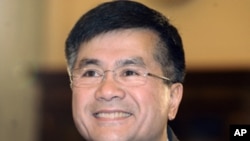"America's creative industries shape how we see ourselves, and how the world sees us as well," said U.S. Secretary of Commerce Gary Locke. "Our copyrighted works continue to be one of the best global marketing tools for the possibilities that exist in America."
Speaking at a Commerce Department symposium in Washington, D.C., on "Copyright Policy, Creativity, and Innovation in the Internet Economy," Secretary Locke noted that "even in the midst of major economic challenges," the United States is experiencing impressive growth in the Internet economy. Sales of digital music downloads in the United States cleared $3 billion in 2009, a 19 percent increase above 2008. Revenues from the sale of e-books in 2009 totaled more than $300 million, an increase of 177 percent from the previous year. And revenues from subscriptions for online games reached $2.8 billion in 2009.
Protecting copyrighted intellectual property is vital to growth of the Internet economy. Online copyright infringement, said Secretary Locke, "is a global concern, and U.S. companies – particularly those operating in many emerging economies – are facing endemic Intellectual Property theft that is costing them money and jobs."
Copyright pirates continue to develop and refine methods of stealing videos, online books, music and other copyrighted materials. In addition to unauthorized distribution of copyrighted works using peer-to-peer file share technology, other technologies such as cyberlockers and streaming are becoming increasingly prevalent tools for piracy.
Secretary Locke said that as government officials work to combat internet piracy, "we need to stay mindful of the benefits that robust information flows have on the innovation process and on society overall." To achieve the right balance between copyright protection and the free flow of information, the United States passed, in 1998, the Digital Millennium Copyright Act. Today we still face the challenge of combating new forms of Internet piracy while preserving the balance of the Digital Millennium Copyright Act.
To help meet that challenge, the Commerce Department recently created the Internet Policy Task Force to identify leading public policy and operational challenges in the Internet environment. The Task Force leverages expertise across many areas – international information and communications technology policy, international trade, cyber security standards and best practices, intellectual property, business advocacy and export control.
"The United States simply must get back to cultivating industries and lines of scientific discovery that provide long-term benefits to society and spur sustainable innovation," said Secretary Locke. Protecting copyrighted materials on the Internet is an important part of that effort.
Protecting copyrighted intellectual property is vital to growth of the Internet economy.




